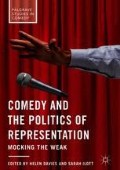Abstract
This piece examines the relationship between Nazism and comedy in popular culture, from film and television, to fashion and YouTube. Does comedy in this context serve a useful political purpose, or does it just reassert the status quo? Issues concerning taste, ethics, comedy as transgression, the unmasking of authority and the purpose of comedy and laughter are addressed here. Of key importance to the themes of this chapter is Look Who’s Back (2015), based on the 2012 novel by Timur Vermes. This reveals support for different current forms of Nazi related ideology is growing. While it might be funny, mocking Hitler and Nazi-related ideology is in many ways shown to be pointless, but comedy can at least provide a stark warning.
Access this chapter
Tax calculation will be finalised at checkout
Purchases are for personal use only
Notes
- 1.
Trump’s attempts at excluding Muslims mirror Nazi policies concerning Jews.
- 2.
The film portrays the characters in a world of their own, emphasising fantasy, and denying the harsher environment and the reality of the politics of the holocaust, so when screened at the Cannes Film Festival in May 1998, some critics found the film offensive. The fact that Benigni was not personally connected to the holocaust also made some question the ethics of the film and its use of comedy.
- 3.
See also Michael Pickering and Sharon Lockyer, for a comparable analysis of the politics of representation in relation to race and Ali G (Pickering and Lockyer 2005, 182–99).
- 4.
It can be argued that the Brexit referendum occurred to bring an end to Conservative Party divisions, which had resulted from members who wanted a harder stance on Europe and immigration joining UKIP. What followed was a mainstreaming of UKIP’s policies by the Conservative Party to gain back voters.
- 5.
In developments in Dialectic Behavioural Therapy for the treatment of depression and other mental health issues, a form of distancing is recommended, including distraction by engaging in activities such as entertainment, including film and television. This sense of objectivity is part of this process of distancing (Rogers and Pilgrim 2010).
References
Anonymous. 2015. “Hitler Really Did Have One Testicle, German Researcher Claims.” The Guardian, 19 December, 2015. http://www.theguardian.com/world/2015/dec/19/hitler-really-did-have-only-one-testicle-german-researcher-claims.
Aquinas, Thomas. 1989. Summa Theologiae. Translated by Timothy McDermott. London: Methuen.
Bakhtin, Mikhail. 1983. The Dialogical Imagination: Four Essays. Translated by Michael Holquist and Caryl Emerson. Texas: University of Texas Press.
Beller, Steven. 2006. Antisemitism. Oxford: Oxford University Press.
Berlet, Chip, and Matthew N. Lyons. 2016. Right-Wing Popularism in America: Too Close for Comfort. New York: The Guildford Press.
Beusch, Danny. 2008. “Queering Nazism or Nazi Queers? A Sociological Study of an Online Gay Nazi Fetish Group.” PhD diss., University of Warwick.
Bonnstetter, Beth. 2011. “Mel Brooks Meets Kenneth Burke (and Mikhail Bakhtin): Comedy and Burlesque in Satiric Film.” Journal of Film and Video 63, no. 1: 18–31.
Clifford, Bob. 2012. The Global Right Wing and the Clash of World Politics. Cambridge: Cambridge University Press.
Collyns, Dan. 2012. “Peru’s Nazi Party Leader Believes Even the Conquistadors Were Jews.” The Guardian, 16 August, 2012. http://www.theguardian.com/world/2012/aug/16/peru-naz-party-leader-believes-conquistadors-jews.
Critchley, Simon. 2002. “Did You Hear the One About the Philosopher Writing a Book on Humour?” Richmond Journal of Philosophy 2 (Autumn): 1–6.
Eagleton, Terry. 2012. Why Marx Was Right. New Haven: Yale University Press.
Eastman, Max. 1981. Enjoyment of Laughter. New York: Darby Books.
Freud, Sigmund. 1985. On Metapsychology. Translated by James Strachey. London: Penguin.
Gross, Daniel. 2015. “Fuhrer Humor: The Art of the Nazi Comedy.” The Atlantic, December 20, 2015. http://www.theatlantic.com/entertainment/archive/2015/12/look-whos-back-nazi-comedies/420081/.
Jenks, Chris. 2003. Transgression. London: Routledge.
Kristeva, Julia. 1991. Strangers to Ourselves. Translated by Leon S. Roudiez. New York: Columbia University Press.
Lopez, David, and Elliss Godard. 2013. “Nazi Uniform Fetish and Role-Playing: A Subculture of Erotic Evil.” Popular Culture Review 24, no. 1: 69–78.
Mitchell, David, and Sharon L. Snyder. 2014. Narrative Prosthesis: Disability and the Dependencies of Discourse. Ann Arbour: Michigan University Press.
Morris, Travis. 2016. Dark Ideas. How Neo-Nazi and Violent Jihadi Ideologues Shaped Modern Terrorism. New York: Lexington Books.
Pickering, Michael, and Sharon Lockyer. 2005. “The Ambiguities of Comic Impersonation.” In Beyond a Joke: The Limits of Humour, edited by Sharon Lockyer and Michael Pickering, 182–199. Basingstoke: Palgrave Macmillan.
Rogers, Anne, and David Pilgrim. 2010. A Sociology of Mental Health and Illness. Maidenhead: Open University Press.
Shaw, Carl. 2005. Satyric Play. The Evolution of Greek Comedy and Satyr Drama. Oxford: Oxford University Press.
Streeck, Wolfgang. 2016. “Scenario for a Wonderful Tomorrow.” London Review of Books 38, no. 7: 7–10.
Vermes, Timur. 2014. Look Who’s Back. London: Quercus.
Author information
Authors and Affiliations
Corresponding author
Editor information
Editors and Affiliations
Rights and permissions
Copyright information
© 2018 The Author(s)
About this chapter
Cite this chapter
Lee, J. (2018). Smile, Hitler? Nazism and Comedy in Popular Culture. In: Davies, H., Ilott, S. (eds) Comedy and the Politics of Representation. Palgrave Studies in Comedy. Palgrave Macmillan, Cham. https://doi.org/10.1007/978-3-319-90506-8_13
Download citation
DOI: https://doi.org/10.1007/978-3-319-90506-8_13
Published:
Publisher Name: Palgrave Macmillan, Cham
Print ISBN: 978-3-319-90505-1
Online ISBN: 978-3-319-90506-8
eBook Packages: Literature, Cultural and Media StudiesLiterature, Cultural and Media Studies (R0)

